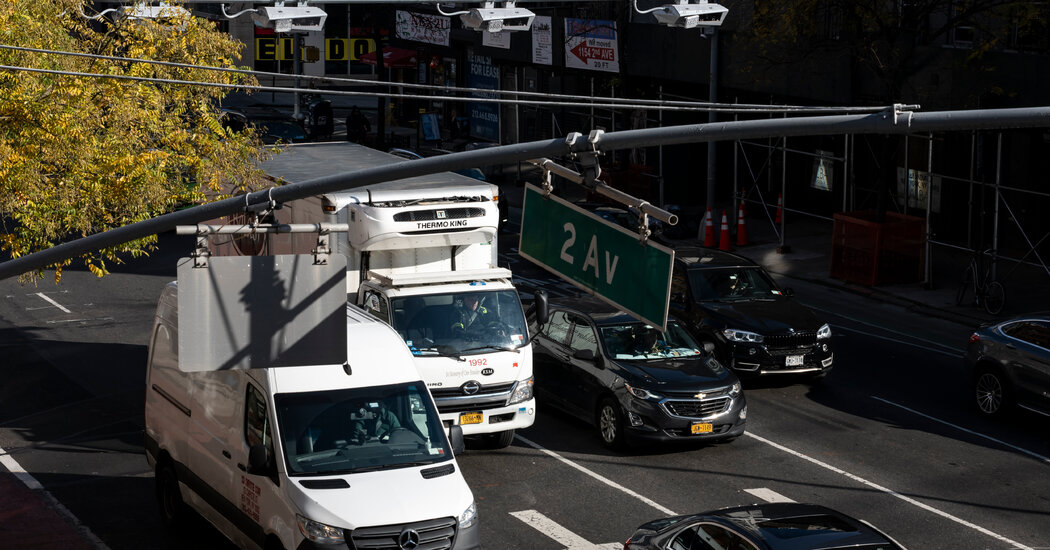Gov. Kathy Hochul of New York may believe she has the power to unilaterally shut down the nation’s first congestion pricing scheme, which was slated to pump $1 billion a year into the coffers of the nation’s largest transit system.
Not everyone thinks she’s right, and her opponents are eager to prove their case in court.
The New York City comptroller, Brad Lander, has assembled a collection of stakeholders to develop a legal strategy that would underpin one or more lawsuits seeking to get the central business district toll program back on track.
Mr. Lander is planning to outline the likely avenues of litigation at a news conference on Wednesday. The gathering underscores the swelling outrage among environmental and transportation advocates who have spent years persuading the government to enact tolls on drivers entering Manhattan’s core — only to see Ms. Hochul abruptly halt the plan less than a month before it was to go into effect.
Michael Gerrard, a prominent environmental lawyer at Columbia University, is spearheading the coalition’s legal strategy, alongside a New York University law professor, Roderick Hills, and Eric A. Goldstein, a senior attorney at the Natural Resources Defense Council.
Mr. Gerrard said the group believes Ms. Hochul may have violated a litany of laws, including the 2019 statute that the State Legislature passed and then-Gov. Andrew Cuomo signed saying that the Metropolitan Transportation Authority “shall” implement the congestion pricing program.
“It creates a mandatory duty, and it doesn’t give the governor the authority to cancel it,” he said. “We believe that the governor broke the law by putting an indefinite hold on congestion pricing.”
He also contended that Ms. Hochul violated the state climate law, known as the Climate Leadership and Community Protection Act, which requires the governor to slash greenhouse gas emissions.
Ms. Hochul has said she based her decision on concerns about the post-pandemic fragility of Manhattan’s central business district and diner patrons’ complaints about expensive tolls. But the timing of her decision, just five months before a pivotal general election and shortly after a visit to the White House, has fed suspicions that her motivations were also political.
The governor has argued that she is merely delaying the program, not canceling it.
“There’s a big difference between a pause and elimination,” she said Monday. “Elimination was an option.”
But Mr. Gerrard said that “an indefinite halt is the functional equivalent of cancellation.”
Mayor Eric Adams, who has himself been lukewarm on congestion pricing, said on Tuesday that he supported Ms. Hochul’s decision and urged New Yorkers to “trust her leadership.”
Not everyone is eager to do so. Several of the mayor’s deputies have spoken out against the decision, including his deputy mayor for operations, Meera Joshi, who also sits on the M.T.A. board.
And although Ms. Hochul effectively controls the M.T.A., Janno Lieber, the authority’s chief executive, used plain language to describe her decision’s painful impact on mass transit in New York City. He said on Monday that the authority would have to drastically shrink its investment program and that his primary goal was to ensure “the system doesn’t fall apart.”
On Tuesday, Mr. Lander described Ms. Hochul’s decision as “disastrous,” and said he expected the coalition to file at least one lawsuit challenging the move, if not more.
“We believe that there’s a strong legal argument that congestion pricing implementation is the law,” Mr. Lander said.
Starting June 30, the M.T.A. was planning to charge E-ZPass drivers as much as $15 to enter Manhattan south of 60th Street, a move that would have raised roughly $1 billion a year in toll revenue. The M.T.A. was, in turn, planning to use that funding to support a $15 billion capital plan, which would have, among other things, enabled the purchase of new subway cars and buses, and the installation of new signals for a system seeing rapidly rising subway delays.
And because the capital plan would also have enabled the construction of more elevators for wheelchair users, Mr. Gerard said the group may also sue under the Americans with Disabilities Act.
Avi Small, a spokesman for the governor, said, “In general, we don’t comment on pending litigation.”
The coalition of organizations exploring potential legal efforts includes transportation groups like the Riders Alliance and the Tri-State Transportation Campaign; environmental groups including the Natural Resources Defense Council and the New York League of Conservation Voters, and watchdog groups like Reinvent Albany and NYPIRG. The Partnership for New York City, which represents major businesses, is also backing the effort.
